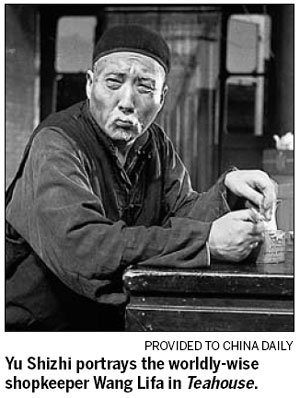Obituary
Yu Shizhi, Beijing People's Art Theater's senior actor and respected scholar of performing arts, died on Jan 20. He was 86.

One scene deeply embedded in his fans' hearts happened in 1992, the year Yu was diagnosed with hemiplegic paralysis. The actor tottered onto the stage after the curtain call of Teahouse and said to the audience, "Thank you for your tolerance."
Already unable to freely control his jaw then, Yu had flubbed a few lines. The humble actor felt it was necessary to apologize to his audience.
Unknown to them and maybe even to Yu, those few words turned out to be almost his farewell speech.
He did one last impressive performance in the drama Bingtang Hulu in 1996 before quitting the stage to spend the rest of his days fighting his illness.
Born in Tangshan, Hebei province, Yu moved to Beijing with his mother soon after his father's death. They were so poor they had to pawn things and rely on their relatives' charity for a living.
Despite their poverty, Yu grew up with colorful dreams. He had wanted to become a linguist, a painter and most of all, a writer.
But the dreams were crushed by cruel reality. He had to drop out of school at 15 and helped support the family by working as a storehouse laborer and copy scribe.
He did keep one ideal.
During his hours off work, he acted with amateur college drama troupes. They mostly performed foreign classics, and by playing those time-honored roles, Yu's acting talent slowly blossomed.
In 1945, he was admitted into the French department at Peking University. But soon he had to drop out again after he lost his job. And that was the turning point of Yu's life - he started acting fulltime.
In 1949, after appearing in a few well-reputed plays, Yu joined the North China Art Troupe, the predecessor of Beijing People's Art Theater.
In 1951, he got his first big role in the local classic Longxugou, portraying a declining artist. He was on a roll since then - from being the tolerant and worldly-wise shopkeeper in Lao She's Teahouse, he played the selfish man in dramatist Cao Yu's Thunderstorm and the kind and optimistic carter in Lao She's Rickshaw.
In the past decades, Yu had also portrayed various grassroots roles.
His vivid portrayal of a dozen epoch-making roles won him the name "the actor of an era" by veteran drama director Huang Zongjiang.
To drama critic Tong Daoming, Yu's strength as an actor also comes from his humble and earnest character.
Tong recalls that Yu once felt severely guilty after his car didn't stop in front of a crowd of greeting fans. Yu even lost sleep once after a reporter called him a master.
In his last wish, Yu had rejected the arrangement of a farewell ceremony and specifically requested not to be called a master in his obituary.
Yu maintained a humble lifestyle. He never visited a hair salon in his life. What he liked most was to have his hair cut by a street-side barber so that he could chat freely with the barber.
It was this close contact with reality that has considerably contributed to Yu's forceful performances.
After retirement, Yu devoted himself to the academic aspects of performing arts, based on his observations and experiences. He completed a long thesis on performing styles that categorizes and discusses Beijing People's Art Theater's acting styles.
Throughout his life, Yu kept his reading habit. He was of the opinion that actors can upgrade themselves by learning literature. He once said that reading had prevented him from going astray.
|
|
|
|
|
|
|
|